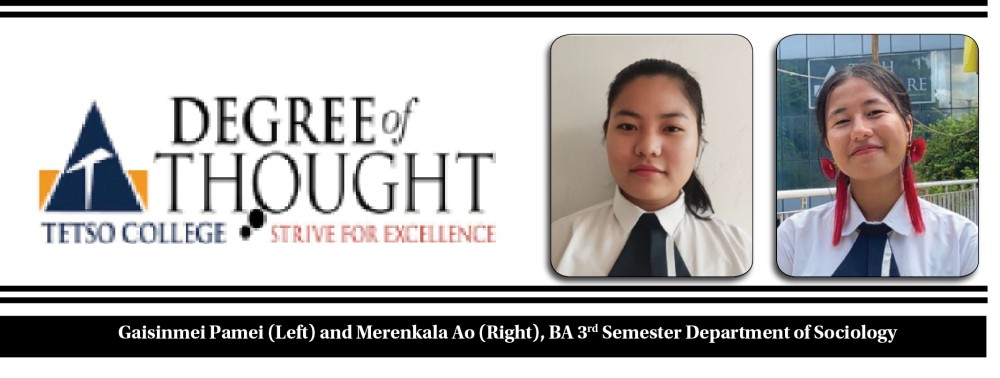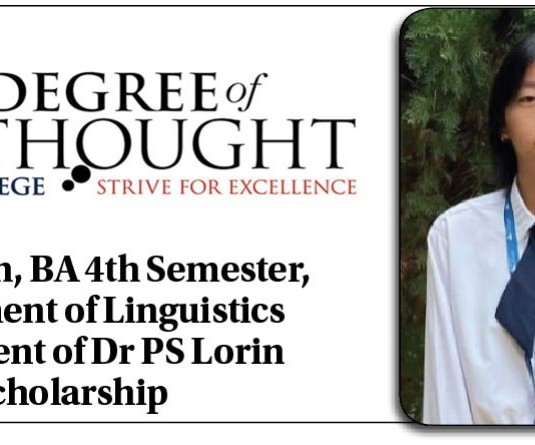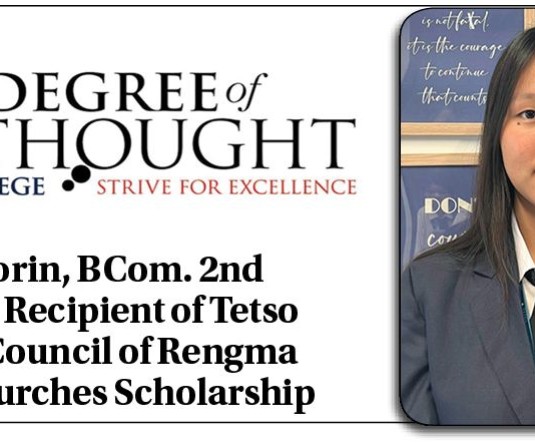
Gaisinmei Pamei (Left) and Merenkala Ao (Right), BA 3rd Semester Department of Sociology
Artificial Intelligence (AI) represents a profound paradigm shift in the way we perceive intelligence, beckoning us to ponder whether one form of intelligence obstructs another. AI, the science of endowing machines with human-like cognitive capabilities, is capable of performing tasks deemed "smart" or exhibiting a semblance of human-like intelligence. It processes vast volumes of data in a manner distinct from human cognition, aiming to recognise patterns, make decisions, and judge, much like humans.
The appointment of an AI robot as an experimental CEO by Dictador, a drinks company in Poland, exemplifies the transformative impact of AI on employment dynamics, a topic of acute concern in nations like India grappling with significant unemployment. Resulting in AI to often be associated with not only the looming spectre of automation and robots, but also the impending job displacement that is starting to come forth.
In the midst of this AI-driven transformation, a crucial reality is often overlooked - AI is wholly dependent on humans. Without the creative genius of software developers and engineers, AI would remain a mere abstract concept. These individuals, with seemingly boundless creative potential, lay the foundation for intelligent machines and ensure their seamless operation.
The educational landscape has undergone a seismic shift due to the pandemic, thrusting educators into reliance on technology for virtual learning. Students have become increasingly reliant on AI tools like ChatGPT, Speechify, and Quillbot for their assignments and presentations. This dependence, however, raises questions about the potential erosion of students' independent thinking capabilities.
In no way do we intend to cast aspersions on AI; instead, we wish to pay homage to the intellectual luminaries who have advanced this field. Thinkers like John McCarthy, one of the founding fathers of AI, have made monumental contributions. Their work has indelibly shaped the landscape of AI, underscoring its vital importance in various facets of life.
The central question revolves around whether the display of AI-driven intelligence impedes the cognitive evolution of individuals. The increasing reliance on AI has the potential to stifle human cognitive capacities, rendering them more artificial and algorithmic in their thinking. Excessive interaction with technology has nudged us toward algorithmic thought processes without a deep comprehension of the underlying algorithms themselves.
Undeniably, AI has elevated living standards and simplified daily life, yet it has also wrought profound changes on human existence. It has engendered impatience and lethargy, with the human brain gradually starving for the sustenance of critical thinking and profound cogitation. Over-reliance on AI can potentially erode professional skills, leading to stress when the situation demands physical or cerebral exertion.
We are currently witnessing a global upheaval where the encroachment of machines poses a dichotomy: a threat to some, a boon to others. As AI assumes an increasingly prominent role within organisations, it has elicited concerns from luminaries like Elon Musk and Stephen Hawking. While it assists humans in prudent decision-making, there exists an implicit risk of diminishing the creativity of the youth. AI can generate creative content, discouraging individuals from nurturing their creative prowess, thereby sowing the seeds of self-doubt.
The erosion of creative abilities among the youth is a stark reality, as AI can adeptly generate creative content. Such over-reliance on AI discourages the development of creative skills, fostering a dearth of self-confidence as individuals begin to believe that AI can surpass human creativity.
The multifaceted world of AI applications presents both benefits and grave consequences. While it serves as a valuable tool for decision-making, AI increasingly replaces human cognitive capacities, from intuitive analysis to critical thinking and creative problem-solving. The implications of this evolution are staggering, raising concerns about the atrophy of cognitive skills, as the age-old adage rings true: "use it or lose it."
In sum, the ascendance of AI engenders a complex interplay between human intelligence and artificial intelligence, raising vital questions about the preservation of human cognitive capabilities. While AI empowers and augments human capacities, it simultaneously threatens to stifle creativity and critical thinking. The challenge lies in harnessing AI's immense potential while safeguarding the essence of human intellect.
The Degree of Thought Column is a weekly community column initiated by Tetso College in partnership with The Morung Express. The column explored contemporary social, cultural, political, and educational issues and challenges around us. However, the views expressed here do not reflect the opinion of the institution. Tetso College is a NAAC-accredited, UCG-recognized Commerce and Arts college. Currently, the Degree of Thought Column is managed by the department of Mass Communication, and the editorial team are Dr Jenny Lalmuanpuii, KC Gabriela and Rinsit Sareo. For feedback or comments, please email:dot@tetsocollege.org.






